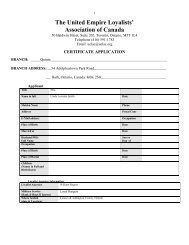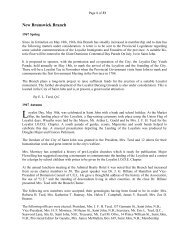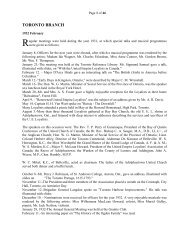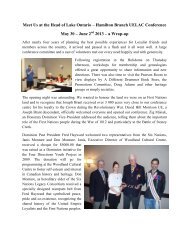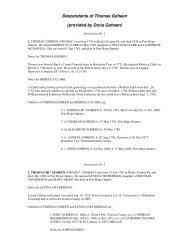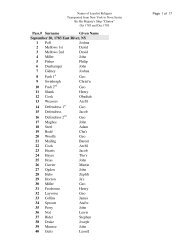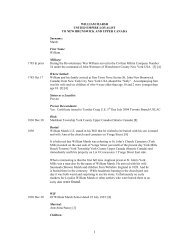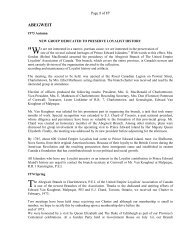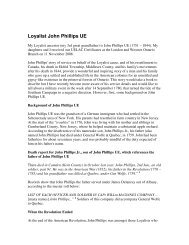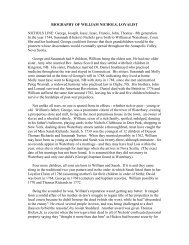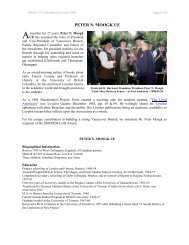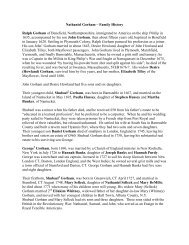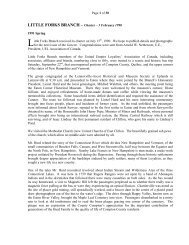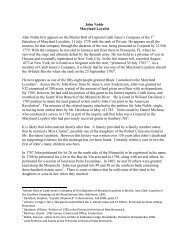Treason In Abington - for United Empire Loyalists
Treason In Abington - for United Empire Loyalists
Treason In Abington - for United Empire Loyalists
Create successful ePaper yourself
Turn your PDF publications into a flip-book with our unique Google optimized e-Paper software.
Among the documents preserved by the Tyson family was a letter which set off the search into<br />
the brothers' Loyalist activities. The return address was simply "Beaver Harbour," and the date<br />
was April 7th, 1787 — four years after the end of the Revolution. It was sent to Isaac Knight<br />
Senior (whom we know as Junior) in care of James Pemberton, Philadelphia — the same James<br />
Pemberton who had been exiled ten years earlier <strong>for</strong> being outspoken in his Quaker anti-war<br />
beliefs.<br />
Honoured Father<br />
I have to trouble thee once more concerning my losses, having been be<strong>for</strong>e<br />
the Commissioners to prove my claims and, falling short of authentick proofs<br />
as to the confiscation and sales to their satisfaction, was desired by them to<br />
procure the condemnation or an acknowledge[ment] of the commissioners that<br />
seized and sold the property with the prices sold <strong>for</strong> or even one of their<br />
Advertisements <strong>for</strong> the sale. Thy procuring the above vouchers will be of<br />
infinite servis to me as I have nothing in my possession to prove the<br />
confiscation nor attainder of my pirson and it is necessary <strong>for</strong> me to prove both<br />
- there<strong>for</strong>e beg that every exertion be mad[e] use of to obtain the proofs<br />
discribed as the whole depends on these things:-<br />
this has been the hardest winter ever known by the oldest inhabitant in this<br />
country; the snow is between two & three feet deep on a level in the woods at<br />
this time; there has been upwards of fifty moos[e] killed within six weeks in<br />
this settlement which has been a grate relief to the <strong>In</strong>habitants, provision being<br />
very scant, many families not having a mouthful of meat nor bread <strong>for</strong> some<br />
weeks be<strong>for</strong>e.-<br />
as to health, we are in a bad state, my wife has been confin'd to the house<br />
most of the winter and is not any better yet. I am much troubled with the<br />
rheumatick pains so as to disable me from work. John's wife has been sick this<br />
three weeks past and not any better.-<br />
so concluding with love to thee and all our relations and friends, not<br />
<strong>for</strong>getting our children.<br />
Joshua Knight<br />
<strong>In</strong> an atlas it takes but a moment to locate Beaver Harbour — a small village in New<br />
Brunswick, less than 20 miles across open water from the eastern tip of Maine.<br />
So the story unfolds: Joshua and John were among the estimated 100,000 Loyalist, then three<br />
per cent of the white population of the new <strong>United</strong> States, who fled from the northern states to the<br />
Maritime Provinces of Nova Scotia and New Brunswick, and from the southern states to the<br />
Bahamas and Florida, to escape the animosity and even violence of their nieghbors. 23 Only a<br />
handful, of course, had actually been accused of treason.<br />
A few of the more moderate Whigs recognized the absurdity of persecuting the Tories after the<br />
war was over. They argued that these misguided people had lost all political influence anyway, so<br />
it would be better to allow them to stay in the <strong>United</strong> States than to drive them off to found an<br />
unfriendly colony to the north. But those who argued thus, no matter how conspicuous their own<br />
service had been in the Continental cause, ran the risk, almost literally, of being tarred with the<br />
same stick.<br />
The British government undertook a huge task in evacuating the Tories, giving them land, and<br />
indemnifying them <strong>for</strong> their losses in the States. Even if the promised 200 acres of farmland <strong>for</strong><br />
the head of each family did not always materialize, Parliament did pay out about $16,000,000 by<br />
1790 to 4,000 refugees, while others received grants of crown-lands, half pay as military officers,<br />
special annuities, or civil service appointments. It might be remarked, parenthetically, that the



